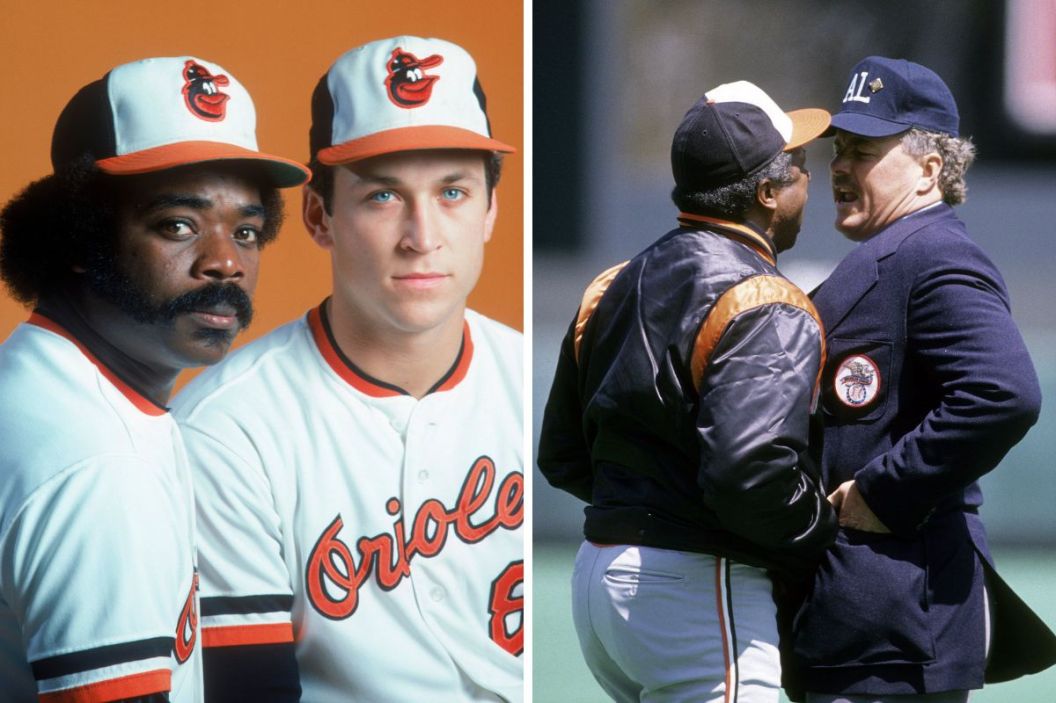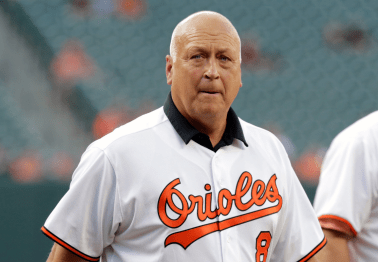From April 4 until April 28, the 1988 Baltimore Orioles were an absolute disgrace.
They lost their Opening Day game, 12-0. Their manager was fired after five more losses in a row. In total, BaLLLLLLLLLLLLLLLLLLLLLtimore lost the first 21 games of the season, which still stands as the MLB record for most consecutive losses to begin a season.
As we marvel at the Tampa Bay Rays' MLB record 13-game winning streak to begin the season — a feat of destruction that makes General Sherman's March to the Sea seem weak — we need to take a look back at the worst start to a season baseball has ever seen.
Here's how it happened.
Baltimore's 21 Losses to Start the 1988 Season
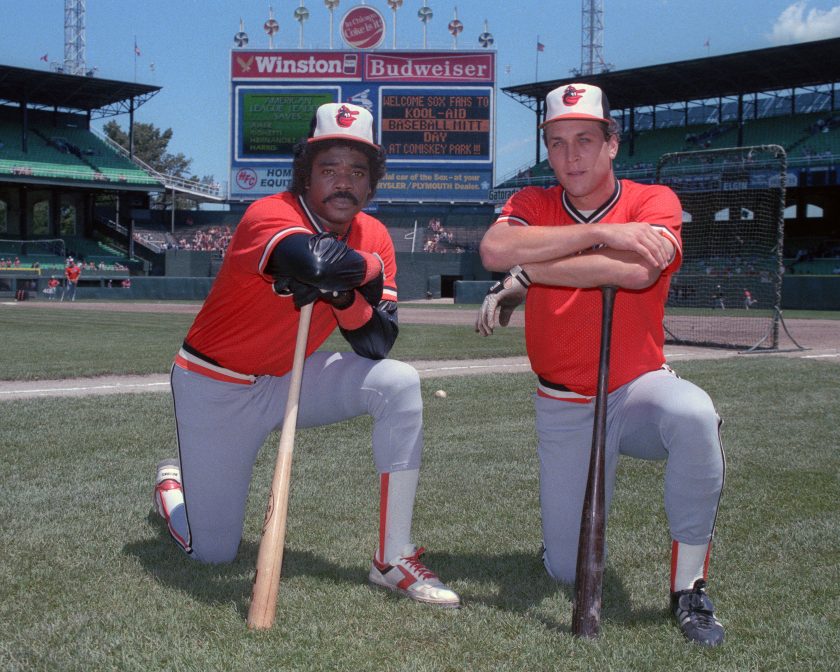
Eddie Murray (L) and Cal Ripken of the Baltimore Orioles pose before a MLB game at Comiskey Park in Chicago, Illinois. Murray played for the Baltimore Orioles from 1977 to 1988. Ripken played with the Baltimore Orioles from 1981 to 2001. (Photo by Ron Vesely/MLB Photos via Getty Images)
First of all, let's start with the who to this disastrous start. Of course, there was Cal Ripken Jr., the 27-year-old Iron Man and future Hall of Famer who was about to enter the prime of his career. Two more Ripkens donned jerseys as well. Cal's brother, Billy, formed a brotherly double-play tandem at second base. Cal Ripken Sr. managed the team, a role he assumed a season prior.
Then there was another member of Cooperstown, Eddie Murray, who manned first base for the O's. And there was Fred Lynn, who won both MVP and Rookie of the Year honors in 1975 for the Boston Red Sox, but was well past his prime.
This team had stars. The lineup was there. The pitching was not. But more on that in a minute, because we need to talk about the losses.
April 4, 1988, a Brewers beatdown, 12-0: A season after finishing 67-95, more than 52,000 Orioles fans crammed into Memorial Stadium to watch their home team get obliterated. Milwaukee's 12-0 blowout was the second-largest margin of victory in a shutout in Opening Day history to that point.
April 11, 1988, Cleveland sends Ripken Sr. packing: The Indians beat the O's 7-2, and following the game Ripken Sr. was fired following an 0-6 start. As MLB pointed out, it was the "fastest firing in baseball history." The next morning, Ripken Sr. had to appear in court to plead guilty to a drunk driving charge. Billy changed his number to 7 to honor his father, and Frank Robinson was hired as the team's new manager.
April 16, 1988, a 1-0 "thriller" nearly end Ripken's streak: Baltimore's 11th-straight loss. Hey, at least this one went to extra innings! The Indians won 1-0 after 11 frames. Ripken Jr.'s average after this game? .051. He was 2-for-39. Iron Man's woes were so bad that Robinson nearly benched him, which would have ended his consecutive games played streak at 915, well short of the then-record 2,130 set by Lou Gehrig. Of course, that didn't happen though. Still, the losing streak was far from over.
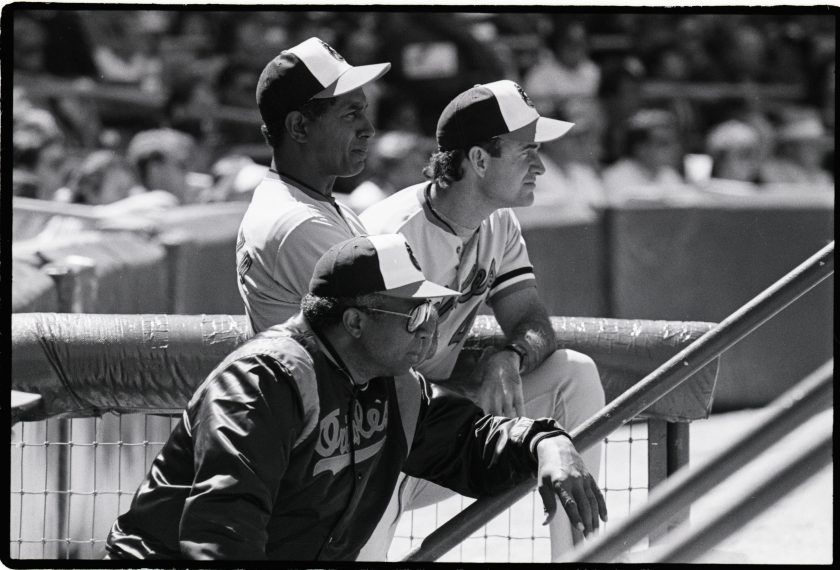
Orioles manager Frank Robinson (in glasses) and coaches Minnie Mendoza (L) and John Hart (R) are not smiling, as the Orioles lose to the White Sox for their 23rd loss with only 1 win in 1988. (Bettmann/Contributor/Getty Images)
April 20, 1988, (bad) history is made: With their 14th loss in a row to begin the season, the Orioles set a record previously held by the 1920 Detroit Tigers, who lost 13. Mike Boddicker, the "ace" of the pitching staff, lost his ninth game in a row dating back to last season.
April 22, 1988, a boiling point for Robinson: Kansas City beat the brakes off the Orioles, 13-1. The game was essentially over in the first inning, when starter Mike Morgan gave up six runs without recording a single out. According to MLB.com, manager Frank Robinson blew up after the game, reportedly yelling at the team for 15 minutes afterward.
"This was not a professional baseball game as far at the Baltimore Orioles are concerned," Robinson barked. "It's embarrassing. ... We're accepting losing, and I'm not going to accept losing."
More losses followed.
April 27, 1988, "like a playoff atmosphere but with laughter": That's how MLB described the aura of this team after beginning 0-19. President Ronald Reagan had even called Robinson after loss No. 18 to offer condolences. And on this day, the Twins beat the O's 7-6 to make them a round 0-20.
30 years ago today, the @Orioles defeated the Chicago White Sox 9-0 to snap a historic 0-21 start to the 1988 season.
The full story comes your way, next on #MLBTonight. #Birdland pic.twitter.com/mRtt6eOGYE
— MLB Network (@MLBNetwork) April 29, 2018
April 29, 1988, a win, finally: The Orioles broke the streak, beating the White Sox 9-0. They celebrated by "pouring cranberry juice on each other." Whatever works. The 21-game losing streak was finally over.
"I'm glad it's over," winning pitcher Mark Williamson said, via the Washington Post. "We've been trying hard every game, but today we got a few breaks. I thought about this game all last night. Everyone had asked me about the pressure, but I didn't really fell any. What was the pressure?
"The worst we could do is lose one more. I'm relieved, but we have to keep it in perspective. It's not like we just won the seventh game of the World Series. Maybe we won't be so much of a household name now."
They lost the next day. They finished April with one win.
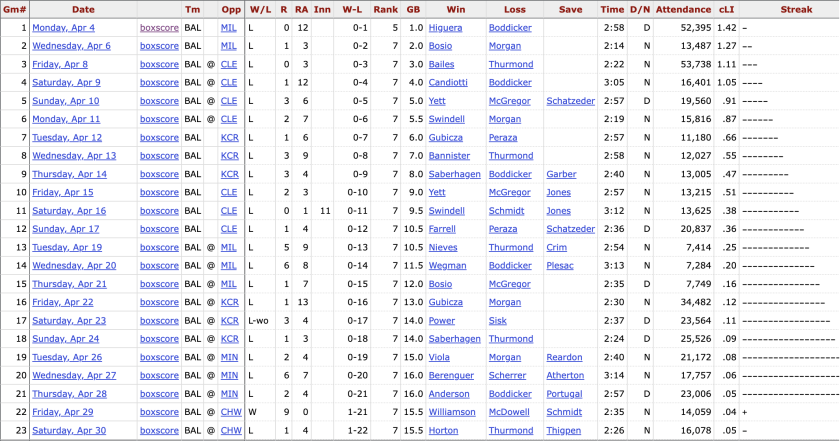
A screenshot from Baseball-Reference showing the 1988 Orioles' disastrous April.
Why Did the '88 Orioles Lose So Many Games in a Row?
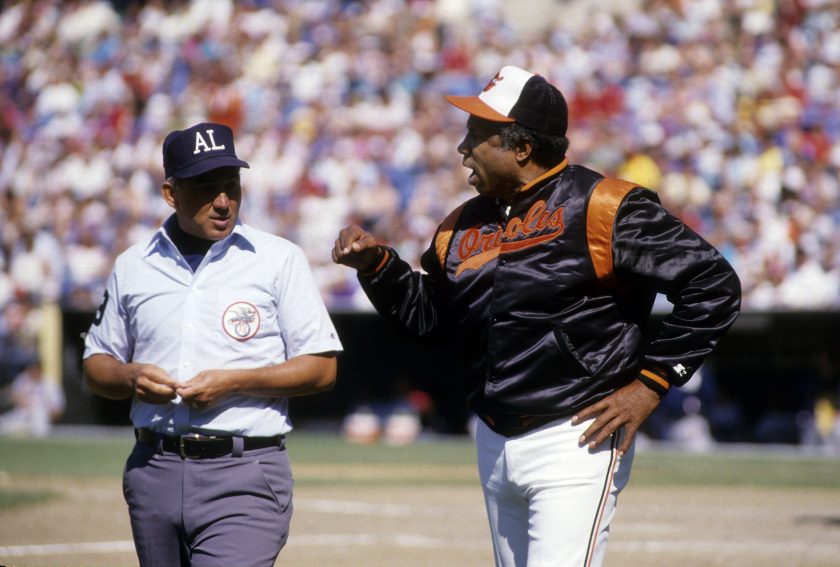
Manager Frank Robinson of the Baltimore Orioles arguing with the third-base umpire during a MLB baseball game circa late 1980's. Robinson Managed the Orioles from 1988-91. (Photo by Focus on Sport/Getty Images)
Look, there's no doubt unluckiness played a part in this incredible losing streak. You have to almost actively try to lose this many games in a row. Maybe Pete Rose was in the dugout somewhere. I don't know.
But this was a combination of awful hitting and awful pitching. The O's scored 44 runs in those 21 losses, good for an average of just over two runs a game. The pitching allowed 129 runs over that span, an average of more than six a game.
It certainly didn't help that nearly everyone in the lineup slumped. Billy Ripken hit .185 over the 21 games. Cal Ripken Jr. hit .211. Eddie Murray hit . 214 with one home run. Speedster Jeff Stone was hitting .137 before he was sent down after the 20th loss.
The 1988 Orioles would go on to lose 107 games, finishing with 54 wins. That really isn't all that bad considering there are dozens of teams in the modern era to finish with less than 50 wins, including the 2019 Detroit Tigers and 2018 Orioles, who both notched 47 wins.
The '88 Orioles and the Death of Their Owner
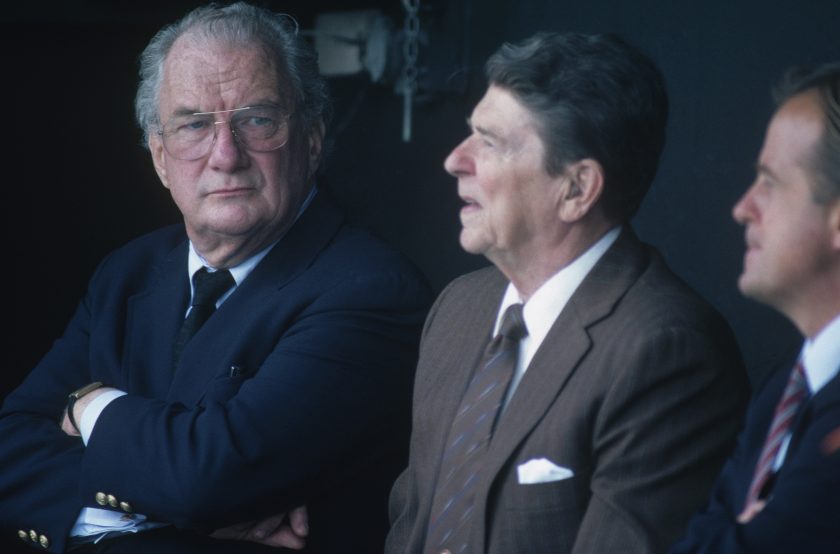
President Ronald Reagan sits and talks with Edward Bennet Williams, owner of the Baltimore Orioles in 1986. (Photo by Focus on Sport via Getty Images)
There weren't many positives to the season, but the O's did put together four-straight wins in early August. However, owner Edward Bennett Williams died nearly a week later on August 13, 1988, after an 11-year battle with colon cancer.
Williams acquired the team in 1979 just before the Orioles went to the 1979 World Series and oversaw a World Series win in 1983. He was there for the good...and the bad.
"While he was winning, he was really having fun," said former owner Jerrold Hoffberger, who sold the Orioles to Williams. "When his illness and the team combined to bring him distress, he didn't have any fun."
A 21-game losing streak likely didn't help Williams' condition. Whether or not that season ended his life earlier remains to be seen. The day after he died, the Orioles beat Milwaukee 11-9. For some reason, the entire game is on Youtube, during which the broadcasters mention the owner's death:
Fittingly, the Orioles lost their next three games.
If anyone ever asks you what streak Cal Ripken Jr. was famously part of, just remember it isn't the consecutive games played streak that deserves mentioning. Because nobody — and I mean nobody — will ever lose 21 games in a row to start the season.
